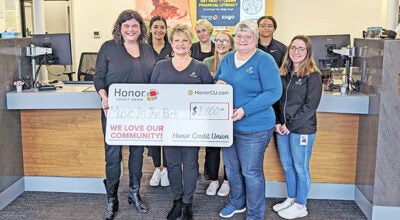Welfare investigator writes book
Published 11:35 am Wednesday, December 5, 2012
EDWARDSBURG — Author Dan E. “Moe” Johnson realized his “bucket list” by 45 — shortly after adding his master’s degree from the University of Notre Dame.
His book, “The Backside of the Helping Hand — The Trials and Tribulations of a Welfare Fraud Investigator” (Corby Books, $16.95) draws on 13 years of a resume that must make prospective employers shudder.
An avid motorcyclist who has ridden as far as Alaska and who carries a pan in his truck from prospecting for gold, Johnson has also been a private detective, bail bondsman and process server.
Johnson, who said his father, who was always reading to him and his older brother, might have given him his nickname because he liked “The Three Stooges.” He also painted houses, was a Social Security Administration claims representative, a stockbroker (in Denver — “I always liked the Rockies”), an insurance agent (hated it), a truck driver and currently guards federal buildings in northern Indiana.
Fresh from the police academy at Lake Michigan College, he interviewed with Dowagiac Police Department and worked for Howard Township.
About the only thing the burly man who grew up on Dailey Road hasn’t done in his adult life is farming.
“I tired of that real early,” Johnson said. “The first thing I drove was a tractor. We raised beef cattle, so we baled a lot of hay. I don’t bale hay or cut wood,” so his wife, a former caseworker, stokes their stove.
Johnson offers a different perspective about social programs and the “professional poor.”
“It sounds cruel, but it’s the truth,” he said Tuesday during an interview at Spicy’s restaurant. “You reap what you sow. If you sit under the shade tree and don’t plant anything, you don’t harvest anything. If you turn your back on free education and refuse to work, what should you be? The CEO of General Motors? … Save your sympathy for the working poor … 40-plus years of social programs have not really helped the professionally poor. We are killing people with kindness, and the federal government is the biggest enabler of them all.
“Would you tell your child to go ahead, quit school, lie around and have some kids? Does any normal working person think this is a good idea? I still fail to understand why society does the same thing over and over again and expects a different result. They always seem to think just one more program will fix it all. Ben Franklin said poverty should be uncomfortable.”
He writes about “the attitude of so many people on public assistance. There was no guilt and no feeling of remorse. It was just the recipient’s way of life and something they seemed to feel was owed to them … Many people on welfare seemed to want to apply their intelligence only to taking money rather than making money. I’m a storyteller, like my dad, and people said I should write a book. I looked at it as a long term paper. They want me to do another one.”
A “history buff,” Johnson majored in history and political science to become a teacher. He substitute taught in Cassopolis, Dowagiac and Edwardsburg.
He graduated from Southwestern Michigan College in 1973, continued his education at Western Michigan University, then hired on as a Social Security claims representative in Benton Harbor.
A windowless basement office made him feel like a “caged cat.”
Johnson worked briefly for th
e Immigration and Naturalization Service (INS) before entering the police academy. “I met a political person, and they were looking for state investigators in Indiana. You get rid of that feeling, ‘Nobody would do that.’ Opening your mind is the first hurdle. People do bizarre things. I ran into the occult” on a case where cats went missing from an animal shelter, charred remains found in fire pits by a sacrificial altar.
“When I went to Notre Dame, most students were younger,” he said. “I’m probably one of the few Notre Dame graduates who never went to a game.”
But the bearded 43-year-old, who worked fulltime, found the campus uncommonly friendly as he toted his book bag. “They thought I was faculty, and they might have me next semester.”






